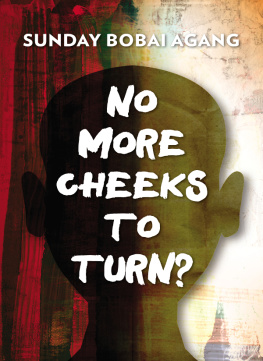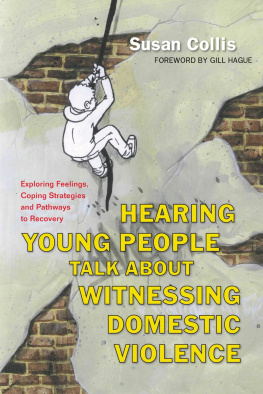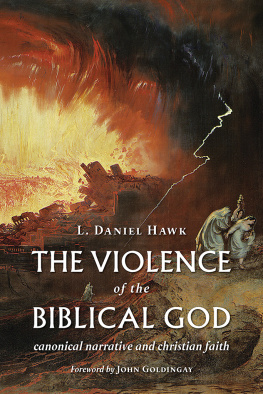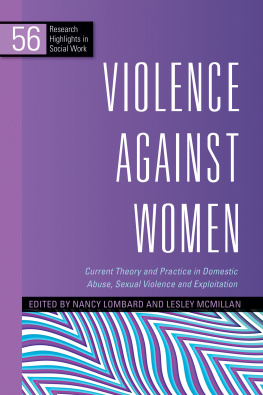M y interest in the study of violence and how it affects humanity dates back to the 1980s. My birthplace, Kafanchan in Kaduna State, Nigeria, used to be the place from which violence spread to other parts of the northern region. Growing up there, I never imagined that I would eventually develop a passion for the study of the subject and how it informs, shapes and determines the theology of the Christian community.
This book had its beginnings in a West African Christian Writers Workshop organized by the Overseas Council International in February 2010 and led by Isobel Stevenson and Bill and Joan Houston. By the end of that workshop, I had developed a proposal for a popular book on violence, which I hoped to finish within a year. But after finishing the first draft, I became discouraged and abandoned the manuscript. Then in 2011, Donna Maxfield asked to see the manuscript and gave me helpful feedback. My thanks go to her for her encouragement and for her willingness to edit the several drafts that I sent to her. I am also grateful to Rev. Dr Ron Rice, who read the entire manuscript and made some invaluable recommendations for improvement. Mrs. Isobel Stevenson had given me similar observations. I sincerely thank her for taking time to read through the manuscript and make suggestions about how to bring the study to a level that will help pastors and church members who are struggling with the challenge of conflict violence in Africa. Dr Paul Todd, my former lecturer in Nigeria, also encouraged me to write. I thank him for his invaluable advice.
I would also like to thank Archbishop Kwashi and Dr Craig Keener for graciously providing a foreword to this book, and the Revd Gideon Para-Mallam for allowing us to use his editorial which reminds us that Christians in Kenya and in other parts of Africa are wrestling with the same issues we face in Nigeria.
Finally, my wife, Sarah and our children, Nancy, Esther, Kent and Dorcas, have stood by me during the writing of this work. Thank you for having been there for me.
FOREWORD
BY ARCHBISHOP KWASHI
S adly, violence and terrorism are facts of life in many countries of the world today. The causes and roots of such situations are not simple, and neither are the responses of a Christian.
Basing his work and his examples on his own country of Nigeria, the author shows how entrenched attitudes and inherited judgements play a negative role in conflicts. Christians should not look to God in order to find support for their predetermined views and to justify their actions. We need to study the Scriptures carefully, being aware of the context, and trying to discern what God is saying to his people in the situation today.
The author has himself experienced at first hand the violence, killing, pain and suffering inflicted by one group upon another, and so he deals with emotional and retaliatory responses with sympathy and understanding, but also with a firm thoroughness as he expounds the Scriptures.
Written in a simple and engaging style, but based on thorough research and scholarship, the book challenges all Christians to a way of life that will be more truly Christ-like. Working for peace and reconciliation will never be easy, but this is our calling, and because of his incomparable power, the God who calls us is indeed able to transform our situation of desperation and agitation into a situation of hope.
In 1987 more than one hundred churches and several Christian homes and businesses were destroyed by Muslim arsonists in Zaria. They carried out this evil without government intervention of any sort until the deed was done. As the chairman of the local CAN (Christian Association of Nigeria) at that time, I circulated all churches and Christians throughout Zaria asking them not to retaliate, and miraculously the Christians stood still and watched the destruction of their property during the 72 hours of arson.
While terrorism, violence and persecution of Christians will not go on forever, the Christ-like life we live will last for eternity. Our response therefore in trying and testing times such as those Bobai describes in Northern Nigeria is a test of our faith, and we must not fail.
It is my pleasure to recommend this book most highly not only to individual Christians but also to churches and community groups. It will repay careful consideration and study, and by the grace of God, can become a powerful tool in the much needed transformation of society today.
The Most Rev Dr Benjamin A. Kwashi
Anglican Archbishop of Jos
S ome years ago peaceful, unarmed Christians protesting against the imposition of sharia law were gunned down in the Nigerian city of Kaduna. Sunday Agang, who was my student at the time, was anxious about the safety of his wife and brothers, whom he thought might have been present during the protest. We later learned that they were safe, but Sunday still had good reason to feel devastated.
As Sunday and I prayed together, I evoked the biblical cries of the oppressed. Rise up, O Lord, mighty warrior! I cried. Trample down the enemies of your people! When I finished, Sunday prayed. Oh God, forgive them! he pleaded. We know where we will be when we die, but our oppressors have no hope. Sunday loved his enemies and prayed for those who persecuted him. I, however, was embarrassed. My prayer was biblical, but Sundays followed an even purer biblical path, and I was moved by his example.
Blessed are the peacemakers, Jesus said. That blessing certainly includes Sunday. In this book, Sunday deals sensitively with feelings and experiences that he understands all too well, feelings of fear, mourning, frustration, and anger. In the end, however, he still summons us to follow the costly way of our Lord Jesus. He invites us to recount stories of hope, rather than stories that incite more violence. As James warns us, Let everyone be quick to hear, slow to speak, slow to anger, since human anger does not effect Gods righteousness (Jas 1:1920). Working for peace can be difficult and costly, as the martyrdoms of Gandhi, King, and especially our Lord Jesus remind us. But Jesus modelled the way of peace, and invites us to be his disciples even when it is difficult.









